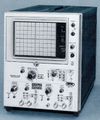5030: Difference between revisions
(pictures) |
|||
| Line 1: | Line 1: | ||
{{Oscilloscope Sidebar | | |||
title=Tektronix 5030 | | |||
summary=1 MHz, 10 μV dual-beam scope | | |||
image=Tek r5030.jpg | | |||
caption=Tektronix R5030 | | |||
introduced=1969 | | |||
discontinued=1972 | | |||
manuals= | |||
* [[List of manuals that are needed|Manual needed]] [[Category:Manual needed]] | |||
* ''See [[5031]] for similar manual'' | |||
* [http://w140.com/tek_r5030_1969_catalog.pdf Tektronix R5030 in 1969 Catalog (PDF)] | |||
* [[Media:Tek 5030 5031 from Catalog 1970.pdf|Models 5030/5031 in 1970 catalog (PDF, 8 pages)]] | |||
}} | |||
The '''Tektronix 5030''' is a [[dual-beam scopes|dual-beam oscilloscope]] that was [[introduced in 1969]] (no longer listed in the 1973 catalog). There is a portable benchtop model, the 5030, and a rack-mount version, the R5030. The sister model [[5031]]/R5031 is an almost identical (analog) storage scope. | |||
The 5030s feature differential and current probe (for [[P6021]]) inputs on both channels. Input ranges are similar to the contemporary [[3A9]] diff/current amplifier plugin but without the variable bandwidth and DC offset controls. The horizontal deflection system is shared. | |||
The 5031/5030 include a readout system which uses small lightbulb/fiber dot matrix displays external to the CRT, similar to that in the [[576]] curve tracer. Only the first and last steps on the time/div and volts/div switches are labelled. | |||
{{BeginSpecs}} | |||
{{Spec | Bandwidth | DC to 1 MHz (5 kHz limit switchable) }} | |||
{{Spec | Deflection | 10 μV/Div to 10 V/Div or 1 mA/Div to 200 mA/Div (1—2—5) }} | |||
{{Spec | Noise | < 15 μV / 200 μA }} | |||
{{Spec | Input impedance | 1 MΩ // 50 pF }} | |||
{{Spec | Time base | 1 μs/Div to 5 s/Div (1—2—5), magnifier up to × 50}} | |||
{{Spec | CMRR | 100,000:1 to 100 kHz }} | |||
{{Spec | X input | 20 mV/Div to 500 mV/Div on Ext Horizontal, or Channel 2 in X-Y mode}} | |||
{{Spec | CRT | 8 × 10 Div @ 1.27 cm (0.5"), P31 phosphor }} | |||
{{Spec | Acceleration | 4 kV }} | |||
{{EndSpecs}} | |||
==Links== | |||
* [http://www.eevblog.com/forum/testgear/interesting-readout-device-in-an-old-tek-r5030-scope/ Interior pictures] | |||
==Pictures== | |||
<gallery> | |||
File:Tek-5030-catalog.jpg | 5030 (catalog image) | |||
File:Tek r5030.jpg | R5030 | |||
File:Tek-5031-display3.jpg| Display detail (5031) | |||
File:Tek-5031-fiberoptic-readout.jpg | Detail of fiberoptic readout module | |||
</gallery> | |||
==Schematics== | |||
<gallery> | |||
File:Tek r5030 sweep.png|Sweep schematic | |||
</gallery> | |||
[[Category:Dual beam scopes]] | |||
[[Category:CRT based solid-state scopes]] | |||
Revision as of 02:19, 20 February 2015
The Tektronix 5030 is a dual-beam oscilloscope that was introduced in 1969 (no longer listed in the 1973 catalog). There is a portable benchtop model, the 5030, and a rack-mount version, the R5030. The sister model 5031/R5031 is an almost identical (analog) storage scope.
The 5030s feature differential and current probe (for P6021) inputs on both channels. Input ranges are similar to the contemporary 3A9 diff/current amplifier plugin but without the variable bandwidth and DC offset controls. The horizontal deflection system is shared.
The 5031/5030 include a readout system which uses small lightbulb/fiber dot matrix displays external to the CRT, similar to that in the 576 curve tracer. Only the first and last steps on the time/div and volts/div switches are labelled.
Key Specifications
| Bandwidth | DC to 1 MHz (5 kHz limit switchable) |
|---|---|
| Deflection | 10 μV/Div to 10 V/Div or 1 mA/Div to 200 mA/Div (1—2—5) |
| Noise | < 15 μV / 200 μA |
| Input impedance | 1 MΩ // 50 pF |
| Time base | 1 μs/Div to 5 s/Div (1—2—5), magnifier up to × 50 |
| CMRR | 100,000:1 to 100 kHz |
| X input | 20 mV/Div to 500 mV/Div on Ext Horizontal, or Channel 2 in X-Y mode |
| CRT | 8 × 10 Div @ 1.27 cm (0.5"), P31 phosphor |
| Acceleration | 4 kV |
Links
Pictures
-
5030 (catalog image)
-
R5030
-
Display detail (5031)
-
Detail of fiberoptic readout module
Schematics
-
Sweep schematic




